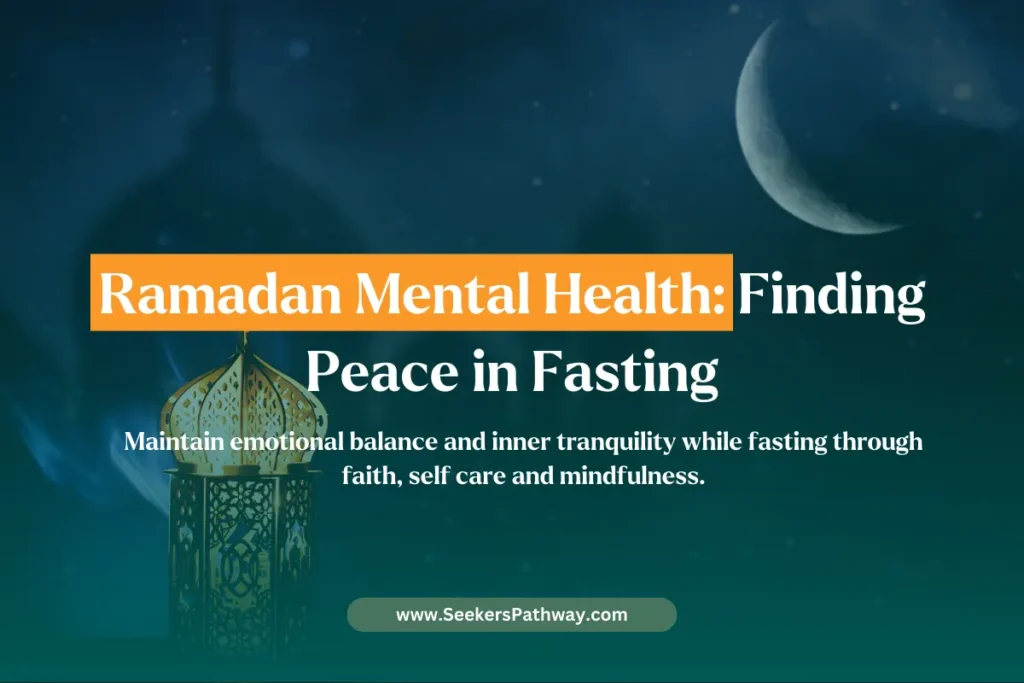The Mind and Soul in Harmony
Ramadan is a month of spiritual elevation, self-discipline, and inner peace. While we spend this month getting closer to Allah, praying, fasting, and doing self-awareness and improvement, we also need to keep our emotional and mental health in focus. Having a balanced mind leads to an improved Ramazan, where the believer can observe patience, gratitude, and coolness in the heart.
While fasting does entail refraining from food and drink, it also requires a relinquishment of control over emotions, thoughts, and deeds. This connection is emphasized by the Prophet Muhammad (ﷺ) when he said:
“Fasting is not just about abstaining from food and drink, but from vain speech and foul language. If one of you is abused or provoked, let him say: ‘I am fasting.’”
(Sahih al-Bukhari 1904, Sahih Muslim 1151)
This hadith also reminds us that fasting is much more than a physical act; it is a spiritual workout fostering mental strength, emotional intelligence, and self-discipline. However, a lot of people have issues with stress, fatigue, mood swings, and anxiety while fasting. Here we present practical tips to maintain mental well-being during Ramadan, helping you achieve a holistic balance between mind, body, and soul.
Understanding the Impact of Fasting on Mental Health
Fasting has deep psychological and neurological benefits. Research suggests that fasting facilitates clear thinking, increases emotional stability, and reduces stress. It also promotes mindfulness and patience, the two mental health necessities.
Allah (SWT) reminds us:
“Verily, in the remembrance of Allah do hearts find rest.”
(Surah Ar-Ra’d 13:28)
Fasting instills the soul with simple joy. When observed sincerely, one can deal with stress, conflict, and emotions more easily and in control. But, in the absence of effective self-care, fasting can also cause fatigue, irritation, and emotional instability.

Managing Stress and Anxiety Through Spiritual Connection
The benefit Ramadan has on mental health is one of the greatest, primarily being a chance to reset on a spiritual level. The worldly pressure often is a source of stress and anxiety, but Ramadan re-centers our focus on things that matter, such as having faith and being grateful, and improving oneself.
To find comfort from stress, faithful people should:
- Salah (prayer) – Salah acts as a very powerful relaxation activity, which provides a sense of tranquillity and clarity.
- Read Qur’an – The Qur’an is filled with guidance and reassurance, waiting to be discovered, which soothes and reassures feelings of worry.
- Repeat Dhikr and Dua often – Reciting remembrance of Allah will bring calm and stability to your mind and heart.
The Prophet (ﷺ) encouraged believers to turn to prayer and supplication during times of distress, as seen in this powerful dua:
“O Allah, I seek refuge in You from anxiety and grief, from weakness and laziness, from miserliness and cowardice, from the burden of debts and the oppression of men.”
(Sahih al-Bukhari 6369)
Intensifying spiritual connection leads to reduced stress and greater emotional stability throughout Ramadan.
Maintaining Energy Levels to Prevent Mood Swings
Fasting affects blood sugar levels and hydration, which can influence mood and cognitive function. One of the common signs of low energy is irritability, impatience, and emotional sensitivity. To stay mentally and emotionally balanced, we must:
- Have a healthy Suhoor – Essential food types (fiber, protein, healthy fats) maintain balanced energy levels.
- Stay hydrated – Dehydration can lead to fatigue and mood swings, so drinking plenty of water between your Iftar and Suhoor is vital.
- Limit caffeine and sugar — These can cause energy crashes that affect our emotional stability.
- Get sufficient sleep — Sleep deprivation is a known culprit for increasing stress and decreasing the ability to concentrate.
If we eat and drink appropriately, fasting is a source of strength and not a cause of fatigue.
Balancing Responsibilities Without Overwhelm
A lot of people have been working at balancing work, family, worship, and self-care in Ramadan. Incorporating the extra Taraweeh prayers, additional Qur’an recitation and preparing meals can sometimes lead to overwhelm and burnout.
To maintain mental balance:
- Establish practical Ramadan goals — Aim for consistency, not perfection.
- Put yourself first – Resting when you need to, engaging in distractions (but not excess), and limiting stressors can help with mental health.
- Delegate – When family members help with meal prep and house tasks, it eases pressure.
- Time management – Structured daily practices deed in a routine ensure that spiritual commitment is met without fatigue.
The Prophet (ﷺ) taught moderation in worship and daily activities, emphasizing consistency over excessive burden:
“The most beloved deeds to Allah are those that are consistent, even if they are small.”
(Sahih al-Bukhari 6464, Sahih Muslim 2818)
Reducing the stress to a minimum allows the believers to enjoy and benefit from the blessed month of Ramadan to the fullest.
Strengthening Emotional Resilience and Patience
Fasting is a combination of patience and a test of emotions. Our emotions can sometimes rise and fall during Ramadan due to hunger, tiredness, or other daily reasons. Identify and confront emotional triggers and learn how to better control them.
The Prophet (ﷺ) advised:
“When one of you is fasting, he should not behave foolishly or argue. If someone insults him, let him say: ‘I am fasting.’”
(Sahih al-Bukhari 1894)
To give ourselves greater emotional resilience, it can be useful to:
- Respond with patience instead of getting into unnecessary arguments and negativity so that your inner peace becomes stronger.
- Be kind – Assisting others is good for emotional health.
- Be thankful — Reminding yourself of your blessings relieves stress and boosts satisfaction.
Anger management matters and is essential for everyone’s mental health, especially during the holy month of Ramadan, where disciplinary patience will earn one better rewards and lead them to a higher spiritual elevation
Seeking Support and Community Connection
Isolation can negatively affect mental health, especially for those fasting alone or having issues with their mental health. Connecting with family, friends, and the community helps provide that emotional support and motivation.
During Ramadan, it is the time to strengthen ties, be it through:
- With prayer in congregation, we share iftar (dinner).
- Organizing and sharing Iftar meals reaffirms social ties.
- Enjoying charitable work (noble acts) makes both the rich and the poor happy.
The Prophet (ﷺ) encouraged togetherness, stating:
“A believer to another believer is like a building whose different parts reinforce each other.”
(Sahih al-Bukhari 2446, Sahih Muslim 2585)
Family or community support is essential for mental health and well-being, particularly in Ramadan, as it provides a support system and a sense of community.
Conclusion: Achieving a Balanced Ramadan
Ramadan is a moment to nurture the mind, body, and soul. Fasting, when placed with an emphasis on spirituality, self-care, emotional regulation, and strengthening community, therefore, can therefore promote our mental well-being.
The fast is not something that is supposed to be hard, but is supposed to be a journey to self-control, reflection, and peace. When we fast this Ramadan in the manner it is intended, we become more patient, emotionally more balanced, and more importantly, closer to Allah.
“O Allah, grant us peace of heart, tranquility of soul, and clarity of mind in this blessed Ramadan.” Ameen.










